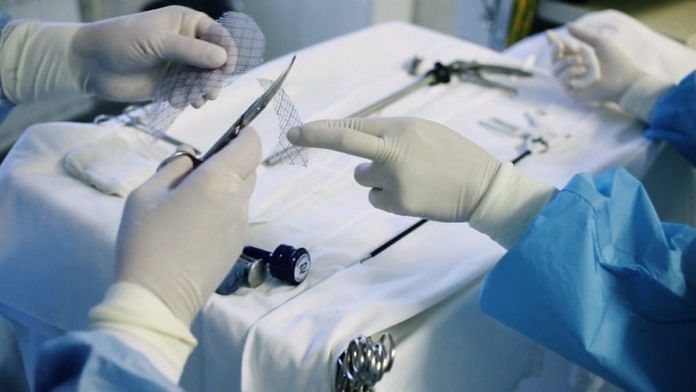New Delhi: The Modi government is considering stopping the sale of pelvic surgical mesh meant for women after the US health regulator, the Food and Drug Administration (FDA), banned it Tuesday.
The mesh is a medical device popularly used to support the abnormal descent of the pelvis in women. It is a cloth-like piece of netting made of synthetic material that is used to provide additional support to weakened or damaged tissue; for instance, after childbirth or due to increasing age or hernia.
It has, however, been under the scanner in the recent past. Last year, a Netflix documentary, The Bleeding Edge, highlighted the injuries caused by vaginal mesh to American women.
Triggered by a significant rise in the number of adverse complaints associated with the use of the device, the FDA Tuesday ordered medical device companies to stop the sales and distribution of surgical mesh.
In turn, the Indian government is also reviewing the situation.
“We have taken the note of the move (taken by US FDA) and we are examining it in the Indian context,” Preeti Sudan, health secretary, Ministry of Health and Family Welfare told ThePrint.
“We track the US FDA and other health regulators on a daily basis and we are working on collecting the details on the usage of the device in India and importers of the product,” said a senior official, who is not allowed to speak to the media, at Central Drugs Standard Control Organisation (CDSCO), the national regulatory body for drugs and medical devices.
“The mesh is among the 23 regulated medical devices in India and a committee has been formed to discuss the US FDA move and its relevance to India.”
Couldn’t assure the safety of devices in the long term: US FDA
In enforcing the ban, the FDA, in a statement Tuesday, said it found that the manufacturers, Boston Scientific and Coloplast, have not “demonstrated a reasonable assurance of safety and effectiveness for these devices”.
The companies will have 10 days to submit their plan to withdraw these products from the market.
“In order for these mesh devices to stay on the market, we determined that we needed evidence that they worked better than surgery without the use of mesh to repair POP,” Jeffrey Shuren, director of the FDA’s Center for Devices and Radiological Health said in the statement. “That evidence was lacking in these premarket applications, and we couldn’t assure women that these devices were safe and effective long-term.”
According to the FDA, in December 2017, the Australian Therapeutic Goods Administration (TGA) removed from the market all uro-gynaecologic surgical mesh products due to the safety concerns.
In 2018, the United Kingdom and Ireland temporarily stopped the use of all surgical meshes placed transvaginally. In 2018, Scotland stopped all transvaginal mesh procedures until a new “restricted use protocol” could be developed.
Due to increasing lawsuits and complaints, some manufacturers, including Johnson & Johnson, had voluntarily stopped selling them in the US. Johnson & Johnson’s subsidiary, Ethicon, lost a $35 million lawsuit over its pelvic mesh.
By 2019, only two companies were selling the mesh in the US.
Also read: Train grassroots health workers in medical abortions to keep women from quacks, say doctors
Plethora of sellers in India
In India, however, several players sell these devices.
According to an analysis by the All India Drug Action Network (AIDAN), an NGO, the CDSCO has granted registration certificates to over 10 companies to import the mesh. They include Johnson & Johnson, B. Braun Surgical, Davol Inc, Sofradim Production and Boston Scientific Corporation.
Local players producing the mesh include Suture India, HLL Lifecare and Suru International.
“As per AIDAN’s analysis, a number of mesh products for use in hernia repair, urinary incontinence and prolapse repair have been approved in India,” said Malini Aisola, co-convenor of AIDAN.
“Given the horrific adverse events associated with the mesh in Western countries, which has led to the US ban, the CDSCO must take immediate measures to protect Indian patients by initiating local investigations and issuing showcause notices before ordering the mandatory withdrawal of these products from India,” she said.
“The outcomes of mesh use in hernia repairs are similarly disastrous and warrants a full-scale investigation into these devices,” Aisola added.
Mesh is used in India despite complications
In India, the surgical mesh is used by gynaecologists for the repair of the pelvic organ prolapse (POP). The POP is a condition where the muscles of the pelvic floor of women, due to increasing age or childbirth, become weak. In this case, the organs on the pelvic floor such as the bladder and uterus start drooping and need support.
“The use of these meshes is very common to correct the prolapse. However, in the past, we had noticed several serious complications such as the slippage of the mesh into the urinary bladder,” said a gynaecologist who does not want to be named. “While most doctors use another safe technique to correct the prolapse, some still use these meshes. The ban is in the right direction so that we don’t get new patients suffering these serious complications.”
The move was long pending, says Rajiv Nath, forum coordinator of the Indian Medical Device Industry. “The move to curb import of unsafe vaginal mesh is overdue, especially after a Netflix documentary and investigative report by a newspaper, which mention the dubious nexus in sales of meshes and its side effects,” Nath said.
“Moreover, it has become a trend for globally reputed companies to continue to sell their products in India that are otherwise recalled or banned in international markets,” Nath added. “To protect the health of women in India, the government must follow the step taken by the US FDA and stop the sales of these meshes.”
Also read: Modicare CEO wants wellness centres to be one-stop shop for healthcare in rural India



